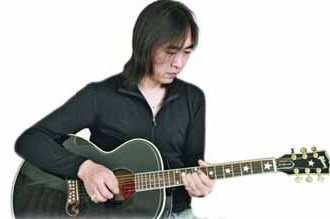

Once a rock guitarist and electronic musician, Chen Zezhao (pictured) surprises many people with his new CD, Landscape of Chinese Ink III, which presents a world of traditional Chinese aesthetics through the Western instrument of guitar.
The CD's 10 tracks are inspired by ancient Chinese poetry, including Recalling Jiangnan by Bai Juyi, Lyrics to Liangzhou Tune by Wang Zhihuan and Nian Nu Jiao - Reflections on the Ancient Red Cliff by Su Shi.
"What we want to present is not only a music album but also a comprehensive work that can promote Chinese culture," Chen says.
Chen started the series of Landscape of Chinese Ink in 2008. In the first two CDs, he interpreted some well-known Chinese music works on guitar.
"After the first album of the series was released, some critics noted that the timbre of guitar in the CD sounded similar to Chinese instruments like guqin or guzheng," says Han Ke, artistic director of Landscape of Chinese Ink.
"Chen and I thought that if what we did is only imitating Chinese instruments, we'd better actually use those Chinese instruments."
After that, they tried to get closer to the inner world of Chinese music.
In Landscape of Chinese Ink III, all the music is original, with inspiration from Chinese poetry.
"We selected some of the best-known Chinese poetry for the CD. I've been reciting them since childhood so I know the artistic concepts in them very well, and it's not difficult to play music based on that," Chen says.
The CD presents the richness of Chinese people's emotions.
For example, Lyrics to Liangzhou Tune describes the desolate but splendid scenery of the northwestern frontier during the Tang Dynasty (AD 618-907): "The Yellow River seems to flow from the sky. The lone fortress stands isolated in sharp contrast to the endless mountain range."
"Why does the sound of the flute seem so sad and miserable? Because the leaders in the prosperous capital didn't care about the soldiers far away on the frontier," the CD's text explains.
Seeing off a Warrior by the Yishui River tells about poet Luo Binwang seeing off a friend by the Yishui River, where he recalled an assassination that happened there.
Phoenix Hairpin tells about poet Lu You seeing his ex-wife with her new husband. He remembered the time they spent together. They still loved each other but were forced to divorce by his mother.
Besides guitar, the album also adopts a number of Chinese instruments like pipa (four-stringed lute), Chinese flute and morinkhuur (horse-head fiddle).
"What we want to do with the series is pay tribute to Chinese culture. In the future, I plan to collaborate with different musicians to interpret Chinese culture, maybe even with a symphony orchestra," Chen says.
Samplings of a Peking Opera aria and natural sounds like wind, flowing water and falling leaves are also used on the CD.
On the cover of the CD, much space was left empty, observing the principle of liubai in Chinese paintings, which aims at creating more room for imagination.
"As time goes by, I think more and more about the roots of my music," Chen says.
"Although I play the Western instrument of guitar, the music I play is all based on Chinese culture."
muqian@chinadaily.com.cn